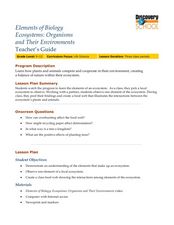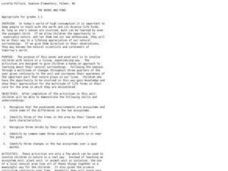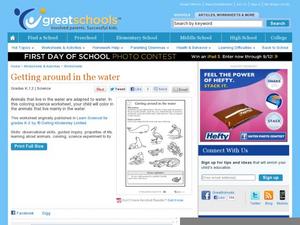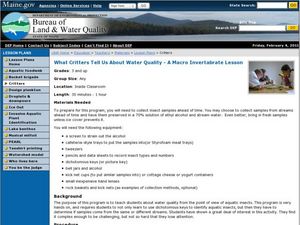Novelinks
Zach’s Lie: Guided Imagery
Close your eyes and picture a time where you decided to tell the truth to someone. What were you wearing? How did you feel? Such prompts begin a guided imagery activity for Zach's Lie. Directions for creating an environment conducive to...
Curated OER
Ecosystems
Third graders identify and define an Ecosystem and the basic needs of all animals. They collect pond water in a pickle jar. They observe the organisms that are in the jar to keep an ongoing record of the creatures and their population.
Curated OER
The City From the Ooze
Students investigate the life in the mud found around ponds. They create Ooze City using pond mud. Students investigate the various layers that form and what type of organisms are in the mud.
Curated OER
Correlation Chapter 1
Students compare ways in which people form different cultures think about and deal with their physical environment and social conditions. They identify examples of change and recognize examples of cause and effect relationships. Students...
Curated OER
Models of Succession
Learners create a model city in order to understand the effects human habitats have on the environment. In this environment lesson, students examine the effects human habitats have on the environment. Learners create a model city and...
Curated OER
Pond Water Web
Learners identify the different organisms in the food web. In this biology lesson, students create food chains using the information on cards. They explain what happens if an organism is removed or added in the web.
Curated OER
Organisms and Their Environments
Young scholars study a local ecosystem and research the organisms to create a food web. In this ecosystem lesson, students view a video and answer questions. They visit a local ecosystem and make a list of organisms to research. Young...
Curated OER
The Woods and Pond
Students explore nature in a living, experiencing way. In this woods and ponds lesson plan, students recognize that ponds/woods environments are ecosystems, identify three of the trees in the area by their leaves and bark...
Curated OER
Daphnia and Algae: A Study of Pond Dynamics
Students observe interrelationships and interdependencies of organisms which may generate stable ecosystems. They also study that living organisms have the capacity to produce infinite sized populations, but environments and resources...
Curated OER
Organisms and Their Environment
Learners observe elements of a local ecosystem and gain an understanding of what elements make up an ecosystem. In this ecosystem lesson students create a class food web that shows the interactions among the elements of the ecosystem.
NOAA
Stressed Out!
Are our oceans really suffering due to the choices humans make? The sixth and final installment in the volume of activities challenges research groups to tackle one of six major topics that impact ocean health. After getting to the...
Curated OER
Animal Habitat Dioramas
What a better way to have learners show what they know than with a diorama? Kids research an animal, its habitat, ecosystem, and environment in order to create a three-dimensional diorama. Have older children write a short paper on their...
Curated OER
Getting Around in the Water
Young scientists who are learning about the variety of environments that animals live in use a activity in order to choose animals that live, primarily, in water environments. There are eight pictures on the activity, and learners must...
Curated OER
The right place to live
How do various plants survive in different environments? They adapt! Kids determine which plant traits make them perfect for their specific environment. They consider three plants and can even complete a plant experiment. Note: Intended...
Curated OER
Reading the River
In collaborative groups, young ecologists measure the temperature, pH, and dissolved oxygen for three different freshwater samples. They examine each sample with a microscope and record observations on the microorganisms in the pond...
Curated OER
Mini-Ecosystems
Third graders identify the living and non living things in a book read aloud and discuss the interactions represented in the book. Then, they research and include a list of food that each animal needs in an ecosystem. Finally, 3rd...
Curated OER
What Critters Tell Us About Water Quality: A Macroinvertebrate Lesson
Students explore our ecosystem by investigating the quality of our water. In this aquatic insect lesson, students examine a group of random insects collected from different streams and ponds in the area. Students record their...
Curated OER
The Living Environment
Students explore the cycles of an ecosystem. In this environmental science lesson, students work in groups to research the nitrogen cycle, the water cycle, or the oxygen-carbon dioxide cycle. Students prepare a PowerPoint or other...
Kenan Fellows
Sustainability: Learning for a Lifetime – The Importance of Water
Water is essential for life—and understanding the importance of clean drinking water is essential in understanding sustainability! Show your environmental science class the basics of water testing and treatment through a week-long...
National Science Teachers Association
Hop into Action
Young scientists find out what makes amphibians such unique and interesting animals in this simple life science lesson plan. After looking at pictures and discussing the characteristics of amphibians, learners complete a series of three...
Curated OER
Eutrophication Lab
Young scholars examine the effects of detergents and fertilizers on aquatic life and describe algae. Students define the term eutrophication as the process by which a body of water, such as a pond, lake, stream, or river, has a sudden...
Curated OER
Protozoans
In this protozoans worksheet, learners observe pond water using a microscope to identify the four classes of single-celled organisms including sarcodines, ciliates, flagellates and sporozoans.
Curated OER
Waterdrops Watershed Issue
In this environment activity, students take part in a variety of activities that includes an experiment, word search, and readings related to the watershed.
Curated OER
Landscaping for Wildlife
Students identify the essential elements needed for promoting wildlife habitat. They describe the terms used in habitat design and the shelter for wildlife. Students explore how to create a pond to support wildlife and how to create a...

























